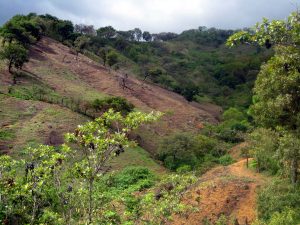
Steep grazing in La Sepultura Biosphere Reserve
Buffer zones between natural forests and more intensive agricultural areas are key to support preservation within. In these areas, sustainable farming activities are ever more important, such as agroforestry or silvopasture. However, and despite monetary and support incentives, adoption of sustainable farming practices is slower than expected.
This study analyses farmers’ perspectives about sustainable innovation, conservation and livelihoods in the tropical forest frontier in Chiapas, Mexico. It uses a semi-qualitative method called Q. The findings reveal three distinct views among individuals, regarding the adoption of silvopasture: those whose pro-environmental views drive their participation; those who stick to proven practices that secure income, and will try novel practices only when other farmers have implemented them; and, crucially, those with an innovative attitude, who try new activities to see what can bring them in the future. In this context, the latter do not necessarily have a higher environmental concern, but are more likely to pioneer sustainable innovations and become an example for others to follow.
See publication at Ecological Economics. “Payments for pioneers? Revisiting the role of external rewards for sustainable innovation under heterogeneous motivations”
Full access to accepted version

Leave a comment